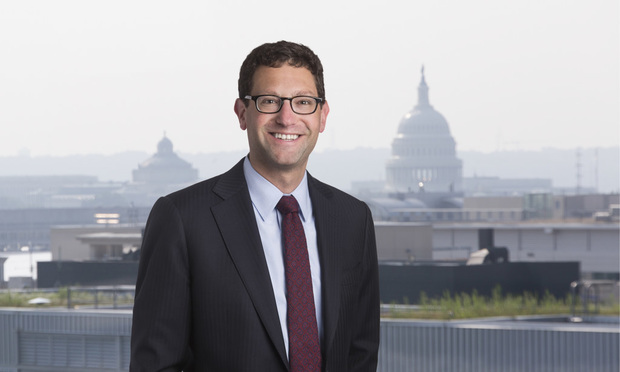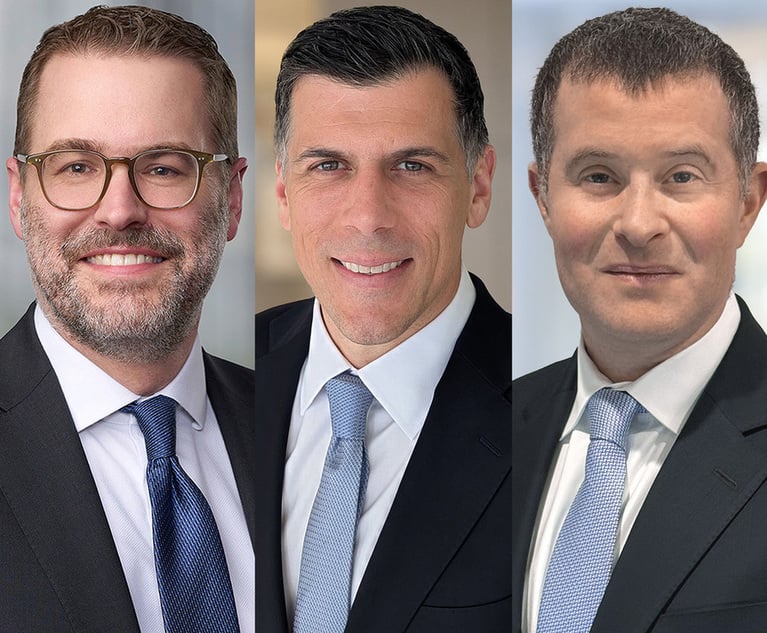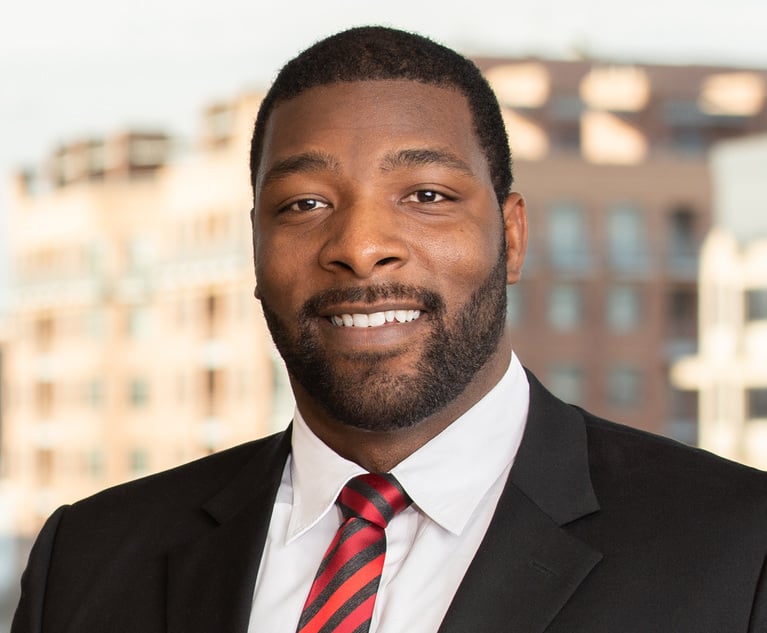Jenner & Block
It's extremely rewarding to be able to use our skills to make a meaningful difference in a person's life and the greater community.
April 30, 2019 at 11:59 PM
3 minute read
 Matthew Price, with Jenner & Block. April 12, 2019..
Matthew Price, with Jenner & Block. April 12, 2019..
Describe your firm's philosophy on pro bono service.
Our firm views pro bono work as central to our identities as lawyers. Not only does the firm view pro bono work as a core professional responsibility, but our attorneys are passionate about serving our communities. We afford our attorneys the freedom to pursue the areas of pro bono representation that most interest and inspire them, and consequently the firm is engaged in a wide array of subject matters.
Of the big cases your firm recently worked on, in People v. Pursley you represented a man wrongly convicted of murder who spent 23 years in prison—as you noted, the first case in the country to allow a prisoner new ballistics testing under a Post-Conviction Testing Act. Tell us more about the case and how you reached the outcome.
We got involved in 2008 after the trial court rejected a pro se motion to allow ballistics testing. In 2011, the appellate court granted our request to retest the ballistics evidence, and we submitted the evidence to two preeminent, independent ballistics specialists who examined it using new technology. They concluded that the bullets and cartridge cases found at the crime scene did not match Pursley's firearm. After an evidentiary hearing in 2016, an Illinois circuit judge vacated Pursley's conviction and awarded a new trial. After a six-day retrial in January 2019, the judge acquitted Pursley, commenting that the defense's ballistics experts demonstrated that the cartridge cases were not fired from the gun attributed to Pursley.
What was the most satisfying aspect of that key case?
The case required a significant amount of work by a large team over more than a decade, including two appeals, two evidentiary hearings, work with experts, a revised post-conviction petition and other proceedings. The client insisted from the beginning that the ballistics evidence would establish his innocence, and it was gratifying to assist him in making that prediction a reality.
Discuss other key pro bono matters recently completed by the firm.
Working as co-counsel with Harvard Law School's Project on Predatory Student Lending, the firm represented a class of ITT Technical Institute students who filed claims against ITT in bankruptcy court in 2017. In November 2018, a federal bankruptcy judge approved a settlement in which nearly $600 million in student debt would be wiped out. The settlement affected 750,000 students, and the agreement also returned $3 million to students who made loan payments to the school after it closed. In March 2019, the firm won significant victories when a federal judge invalidated state plans approved by the secretary of the Department of Health and Human Services requiring Medicaid recipients in Kentucky and Arkansas to work or otherwise lose their Medicaid benefits.
Why does your pro bono work matter to you as a lawyer?
Through our pro bono program, on matters large and small, we are able to provide critical legal services to those most in need and give an important voice to countless clients. It's extremely rewarding to be able to use our skills to make a meaningful difference in a person's life and the greater community.
Responses submitted by Matthew Price and Andrew Vail, co-chairs of Jenner & Block's pro bono practice.
This content has been archived. It is available through our partners, LexisNexis® and Bloomberg Law.
To view this content, please continue to their sites.
Not a Lexis Subscriber?
Subscribe Now
Not a Bloomberg Law Subscriber?
Subscribe Now
NOT FOR REPRINT
© 2025 ALM Global, LLC, All Rights Reserved. Request academic re-use from www.copyright.com. All other uses, submit a request to [email protected]. For more information visit Asset & Logo Licensing.
You Might Like
View All
Wilmer, White & Case, Crowell Among the Latest to Add DC Lateral Partners
4 minute read
Lawyers Across Political Spectrum Launch Public Interest Team to Litigate Against Antisemitism
4 minute read

Government Contracting Clients Look to Firms to Stay on Top of Trump Policy Changes
4 minute readTrending Stories
- 1States Accuse Trump of Thwarting Court's Funding Restoration Order
- 2Microsoft Becomes Latest Tech Company to Face Claims of Stealing Marketing Commissions From Influencers
- 3Coral Gables Attorney Busted for Stalking Lawyer
- 4Trump's DOJ Delays Releasing Jan. 6 FBI Agents List Under Consent Order
- 5Securities Report Says That 2024 Settlements Passed a Total of $5.2B
Who Got The Work
J. Brugh Lower of Gibbons has entered an appearance for industrial equipment supplier Devco Corporation in a pending trademark infringement lawsuit. The suit, accusing the defendant of selling knock-off Graco products, was filed Dec. 18 in New Jersey District Court by Rivkin Radler on behalf of Graco Inc. and Graco Minnesota. The case, assigned to U.S. District Judge Zahid N. Quraishi, is 3:24-cv-11294, Graco Inc. et al v. Devco Corporation.
Who Got The Work
Rebecca Maller-Stein and Kent A. Yalowitz of Arnold & Porter Kaye Scholer have entered their appearances for Hanaco Venture Capital and its executives, Lior Prosor and David Frankel, in a pending securities lawsuit. The action, filed on Dec. 24 in New York Southern District Court by Zell, Aron & Co. on behalf of Goldeneye Advisors, accuses the defendants of negligently and fraudulently managing the plaintiff's $1 million investment. The case, assigned to U.S. District Judge Vernon S. Broderick, is 1:24-cv-09918, Goldeneye Advisors, LLC v. Hanaco Venture Capital, Ltd. et al.
Who Got The Work
Attorneys from A&O Shearman has stepped in as defense counsel for Toronto-Dominion Bank and other defendants in a pending securities class action. The suit, filed Dec. 11 in New York Southern District Court by Bleichmar Fonti & Auld, accuses the defendants of concealing the bank's 'pervasive' deficiencies in regards to its compliance with the Bank Secrecy Act and the quality of its anti-money laundering controls. The case, assigned to U.S. District Judge Arun Subramanian, is 1:24-cv-09445, Gonzalez v. The Toronto-Dominion Bank et al.
Who Got The Work
Crown Castle International, a Pennsylvania company providing shared communications infrastructure, has turned to Luke D. Wolf of Gordon Rees Scully Mansukhani to fend off a pending breach-of-contract lawsuit. The court action, filed Nov. 25 in Michigan Eastern District Court by Hooper Hathaway PC on behalf of The Town Residences LLC, accuses Crown Castle of failing to transfer approximately $30,000 in utility payments from T-Mobile in breach of a roof-top lease and assignment agreement. The case, assigned to U.S. District Judge Susan K. Declercq, is 2:24-cv-13131, The Town Residences LLC v. T-Mobile US, Inc. et al.
Who Got The Work
Wilfred P. Coronato and Daniel M. Schwartz of McCarter & English have stepped in as defense counsel to Electrolux Home Products Inc. in a pending product liability lawsuit. The court action, filed Nov. 26 in New York Eastern District Court by Poulos Lopiccolo PC and Nagel Rice LLP on behalf of David Stern, alleges that the defendant's refrigerators’ drawers and shelving repeatedly break and fall apart within months after purchase. The case, assigned to U.S. District Judge Joan M. Azrack, is 2:24-cv-08204, Stern v. Electrolux Home Products, Inc.
Featured Firms
Law Offices of Gary Martin Hays & Associates, P.C.
(470) 294-1674
Law Offices of Mark E. Salomone
(857) 444-6468
Smith & Hassler
(713) 739-1250








